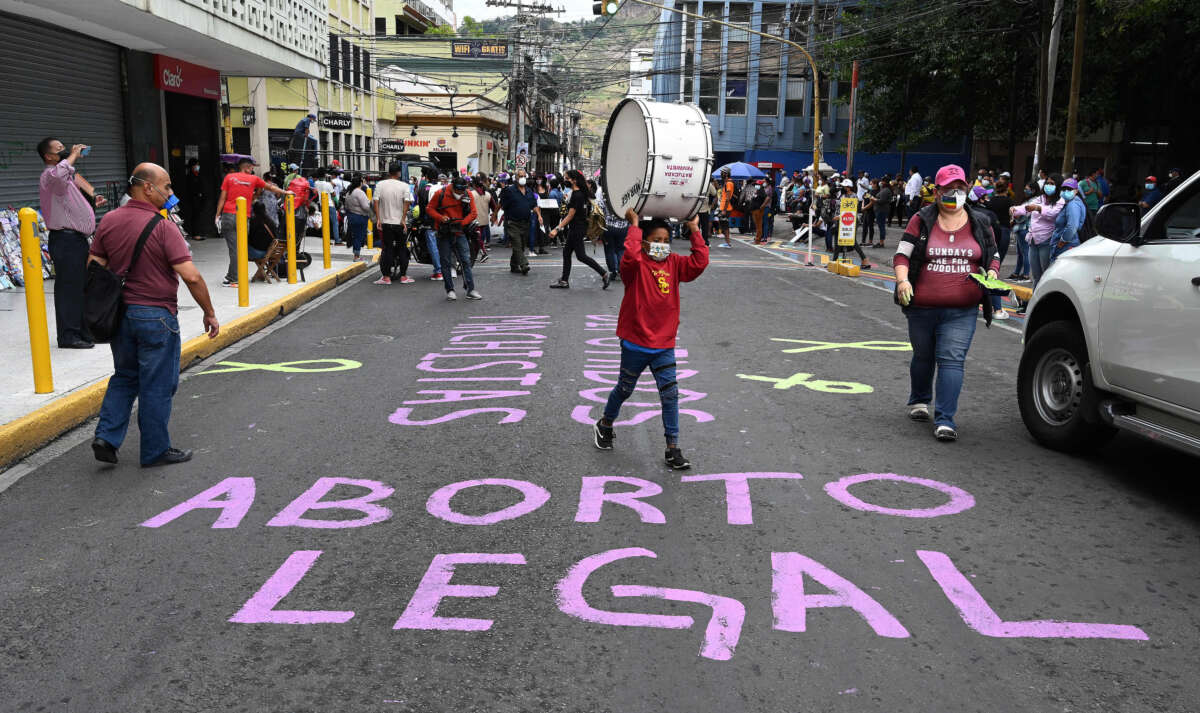An Indigenous woman from Honduras has lodged a complaint with the United Nations (UN) Human Rights Committee, alleging that her country denied her access to an abortion after she was raped. This is the first instance of a Central American country being reported to the UN for its anti-abortion laws.
“Honduras’s regressive policies on sexual and reproductive health constitute clear violations of the fundamental rights of women and girls, including their rights to life, health, privacy, autonomy, and bodily integrity, as well as to live a life free from discrimination, torture, violence, and persecution,” the Center for Reproductive Rights (CRR) said in a press release.
The woman, Fausia, was raped in retaliation for her environmental and human rights work. At the time, Honduras prohibited emergency contraception which could have prevented her pregnancy. When she went to the hospital seeking care, she was threatened with being reported to police if she had an abortion. Fausia, who is being represented by CRR and the Centro de Derechos de Mujeres (CDM), asserts in her complaint to the UN that the country violated her human rights by forcing her to remain pregnant and become a mother.
“Fausia’s case stands as a prime example of the numerous human rights violations that arise from the criminalization of an essential health service. The criminalization of abortion affects all people who may need an abortion, particularly those in vulnerable situations, such as survivors of sexual violence,” Carmen Cecilia Martínez, Associate Director of Legal Strategies at CRR in Latin America and the Caribbean, said in a statement. “Through litigation, we seek justice for Fausia and to prevent incidents like those she faces from recurring. States must ensure the reproductive autonomy of all.”
Abortion is currently outlawed in Honduras with limited exceptions that do not include instances of rape or incest. In 2021, a constitutional amendment enshrined the abortion ban in the country’s constitution. Women who have abortions in the country can be imprisoned for up to six years.
According to the Guttmacher Institute, between 2015 and 2019 there were a total of 174,000 unintended pregnancies in Honduras. Many of these pregnancies were caused by rape. In fact, according to the country’s Ministry of Health data from 2022, every day three girls in Honduras under the age of 14 are forced to carry pregnancies resulting from rape to term and become mothers.
“The lack of access to the [emergency contraception pill] and the criminalization of abortion impact their rights to life, health, integrity, equality, and non-discrimination and contravene the recommendations of the World Health Organization (WHO), which explicitly advised the decriminalization of abortion and its regulation within the realm of public health in its abortion care guidelines published in 2022,” the CRR said in a press release.
Additionally, according to a 2019 Human Rights Watch report, thousands of women in the country are hospitalized annually due to complications from self-induced abortions, with 1 out of every 23 maternal deaths each year attributed to abortion-related causes.
“Research from around the world has shown that when abortion is banned, women don’t have fewer abortions — they just have riskier ones. This endangers their health and even their lives, if the methods are unsafe or if complications are not treated quickly,” the Human Rights Watch report says. “Women in Honduras end pregnancies ‘with a lot of fear, a lot of misinformation,’ an advocate told us.”
Although Fausia is the first to lodge a complaint to the UN, Honduras has previously been warned by UN experts for attacking reproductive rights in the country. “Restrictive laws on abortion increase maternal mortality and morbidity rates due to unsafe abortions and are not effective in reducing the rate of abortion,” UN experts said in 2021. “The number of unsafe abortions in Honduras could be between 51,000 and 82,000 per year.”
By filing a complaint with the UN Human Rights Committee, Fausia, along with organizations supporting her, aims to secure guaranteed access to vital reproductive health care for Hondurans, including access to abortion. Specifically, her complaint requests that the Honduran State ensure access to safe abortion conditions, cease the criminalization of voluntary pregnancy termination, and revise its legal framework to regulate abortion as both a human right and an essential health service in order to fulfill its international human rights obligations.
